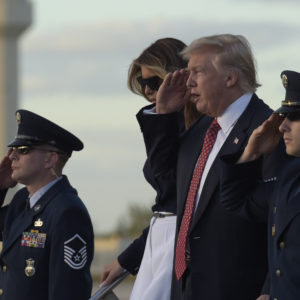Editor’s Note: For an alternative viewpoint, please see: Point: The Case for a Special Counsel to Investigate Trump-Russia Ties is a Slam Dunk
Democrats and their media surrogates have amplified calls for Attorney General Jeff Sessions to appoint a special prosecutor to investigate ties between Russia and the Trump campaign. The allegations may play to a partisan crowd hoping to hijack the Trump presidency, but the facts and the law offer no justification for such demands.
All national security sources indicate that there were is no evidence of unlawful interactions between the Trump campaign and the Russian government. And except for a whisper campaign and alt-left posts repeating unsubstantiated claims, even today there is no smoking gun.
In fact, media-hyped allegations of high-profile political witch-hunts are notoriously poor “cases” for special prosecutors. They chiefly serve only to condemn the innocent without any proof of guilt. Appointing a special prosecutor to investigate any matter — let alone the campaign circle of a sitting president — is a very significant step out onto very slippery ground.
Any investigation pursued by a special prosecutor or “independent counsel” always runs the inherent risk of chasing an indictment to justify the investigation’s costly existence. Political investigations are prohibitively expensive in terms of human and financial capital. The reputations of not only the subjects, but also the prosecutors and those who backed the prosecution are all on the line. The higher the profile, the higher the stakes — and the more pressure there is for the prosecution to find something worth prosecuting. Once again the political witch hunters risk turning “innocent until proven guilty” on its axiomatic head.
Besides, since the law authorizing the Office of the Independent Counsel expired in 1999, there is no longer a three-judge panel — or any disinterested third party — available to select the special prosecutor. Instead, any prosecutor that the attorney general would appoint, the attorney general could also remove.
This means, of course, that the special prosecutor ultimately answers to the president and may not prove quite as “independent” as those calling for the appointment might imagine. In fact, true independence is not possible or desirable. Thus, the “special” prosecution may be directed in part by the very political offices being investigated. Far better to just let the career investigators handle the role. They precede and will succeed any present administration.
The perhaps alluring alternative of appointing a prosecutor accountable to no one would be illegal and dangerous. Such an unaccountable special prosecutor, for example, might redirect the inquiry from the initial question of the Trump’s campaign’s ties to Russia to, say, the Clinton Foundation’s contact with Russian officials. And with no political accountability, a special prosecutor might do so with no reasonable end in sight or limits on the costs of such activity.
No, we have political accountability for prosecutors for very good reasons. But that same accountability makes the prosecutor’s quintessential executive function far from “independent.” And even if a politically neutral investigator could be appointed, we currently lack any real mechanism for ensuring that we have the “right” non-partisan prosecutor acceptable to all parties.
The answer to this inherently political problem is an equally political solution: congressional investigation and, if warranted, impeachment. The Constitution and federal law authorize Congress and the executive branch to investigate and then prosecute illegal conduct. Those investigations performed by elected officials can then be accountable to the American public, as they should be.
As with the Benghazi committee, similar steps can be taken on Capitol Hill to explore allegations about Russia’s supposed contact with Trump’s campaign. Skipping those prudent, constitutional steps and appointing a special prosecutor to go looking for fire before anyone has actually seen smoke is more likely to fan the partisan flames than it is to find the truth.

